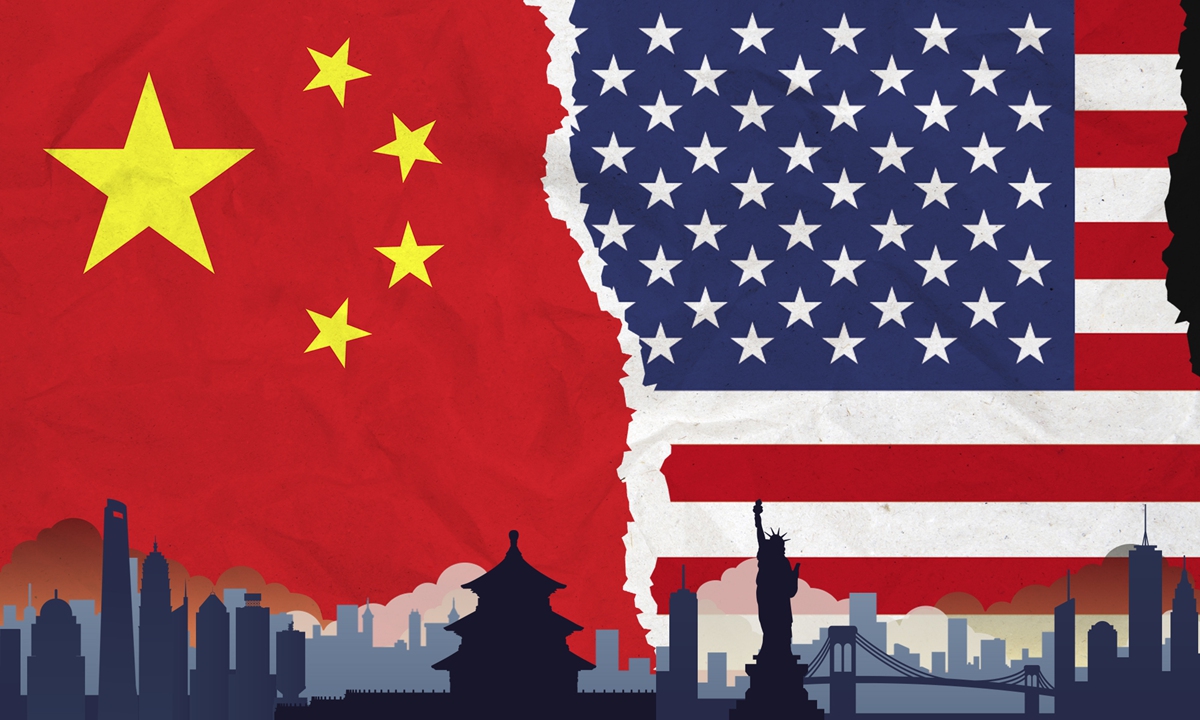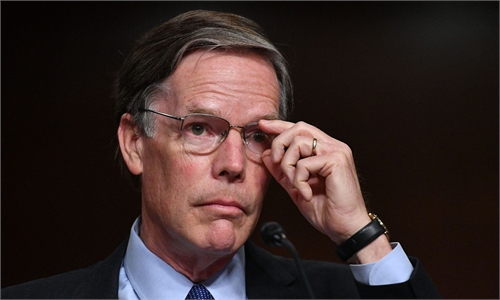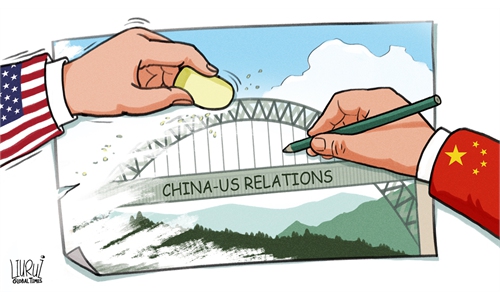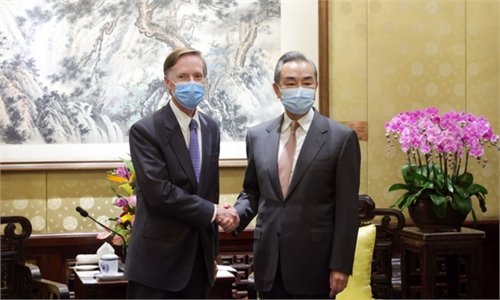US urged to stop wasting China’s goodwill for dialogue, experts say
Recent interactions expose US’ contradictory China policy; flip-flopping does no good to improving ties

China-US Graphic: GT
The battle of words between China and the US continued Thursday with the Chinese Foreign Ministry spokesperson Wang Wenbin refuting US Ambassador to China Nicholas Burns' accusation of China failing stop production of fentanyl. Analysts said that the US should stop wasting China's goodwill in being open to dialogue and should become sincere in improving relations instead of flip-flopping.The US is one country that benefits the most from China's decision on the scheduling of all fentanyl-class drugs, which played an important role in preventing the illegal production, trafficking and abuse. But the US government is ungrateful, and has unreasonably sanctioned Chinese institutions, companies and individuals to undermine the foundation of China-US anti-drug cooperation, Chinese Foreign Ministry spokesperson Wang Wenbin said at a press conference on Thursday.
Wang's remarks came after Burns accused China on Wednesday of failing to stop production of fentanyl when attending the US Global Leadership Coalition forum via video link from Beijing. He also criticized China for "targeting" American companies, including the memory chipmaker Micron Technology Inc, media reported.
This is the latest "verbal crossfire" between China and the US as Washington has talked up its intention to seek communication with China while not giving up provocation on China, especially on military.
Burns' remarks and the recent interactions between China and the US highlighted the duplicity and self-contradiction of the US policy toward China, Diao Daming, an associate professor at the Renmin University of China in Beijing, told the Global Times.
Li Haidong, a professor at the China Foreign Affairs University, said that Burns' remarks also fully expose one of American political elites' old problems - trying to open channels for dialogues via imposing pressure arrogantly. For the US, maintaining communication with China is intended to make it convenient for Washington to raise its demands and requests to China.
The China-US relations are crucial and we need not only stable relations but also stable and mature diplomacy, said Li, noting that as the US ambassador to China, Burns' understanding of China is neither enough nor objective and as an implementer of US government's China policy, Burns, a veteran diplomat, however, has demonstrated less elasticity in handling bilateral relations.
Burns came to China in March 2022 to succeed Terry Branstad as US ambassador to China. Before Burns' arrival, the post was vacant since October 2020 and the bilateral relations were at the lowest ebb in decades.
The US has never been able to correct its prominent old problem of saying one thing and doing another, which also makes it more challenging to remove obstacles to stabilize China-US relations, said Li.
While Chinese analysts are urging the US to take sincere and concrete actions in improving relations, the US side has beefed up efforts in shifting blame to China. For example, a Washington Post commentary on Wednesday criticized China for not "acting like it wants to improve relations with the US."
China's policy and attitude toward the US has never changed and it is the US that has flip-flopped. The international community will not be fooled by the US' attempt to shift blame to China for the current obstacle of bilateral relations, said Diao.
The expert said that the meeting between top leaders of China and the US in Bali November 2022 and the following interactions of senior officials had promoted stable and positive communication between the two sides. However, the US' hyping of the balloon incident in February has frozen the bilateral relations.
"The US should stop wasting the goodwill of China as a responsible country," said Diao, noting that China is willing to push cooperation with the US out of care for the interests of the people from the two countries and the international community, but it will not have dialogue for the sake of dialogue if the US does not take sincere action.
On Wednesday, Chinese Ambassador to the US Xie Feng delivered a keynote speech at the welcome event hosted by the US-China Business Council, during which he said China is always open to dialogue but what is essential is whole-process management - fostering good atmosphere in advance, accumulating outcomes in the process, and delivering on them afterwards.
Xie's remarks aimed to help people in the US better understand China's views on bilateral relations, know the harm of US' current policy on China and enable the two sides to have more balanced and objective communication, said Li.
As the bilateral relations have entered a complicated phase of game, only by working together and meeting each other halfway can the two side prevent the relationship from further deteriorating and turn it back to the right track. But if the US is still obsessed with competition with China and continues to push "decoupling" or "de-risking," the prospects of the relationship are not optimistic, said Li.
The crux of the current China-US relationship lies in the fact that the US has fundamentally and absurdly misunderstood China's intentions and policy. Only when the US changes its erroneous China policy, can the relations improve, said Li.





